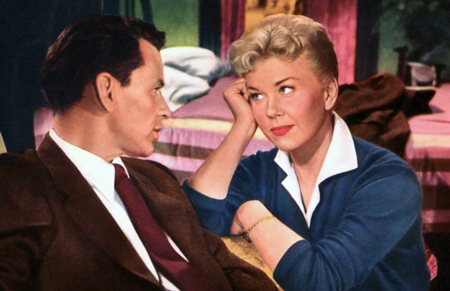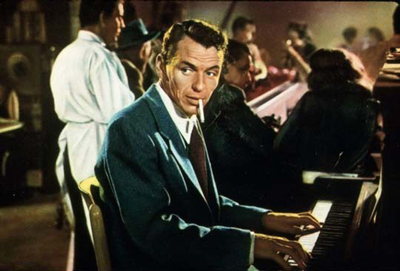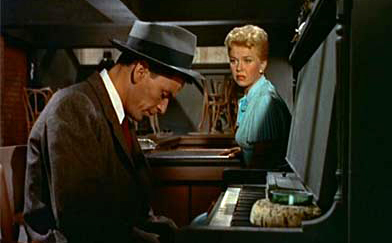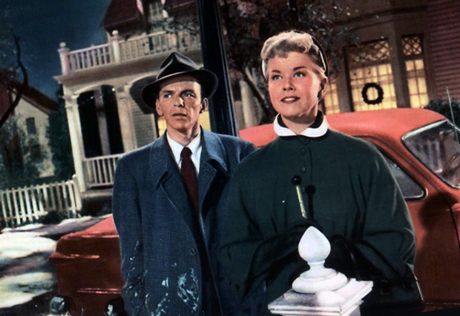|
|
Reviewed by Glenn Erickson
Doris Day and Frank Sinatra's Young at Heart is a romantic musical worthy of re-appraisal. It's an update of Four Daughters, a rather soppy Warners hit from the late 1930s that, minus one daughter, made a star of John Garfield. The color remake has been interestingly restructured. With her Warners contract ending, Doris Day's husband Martin Melcher cut a deal that made his Arwin Productions an equal partner. He snagged Frank Sinatra, then fresh from his comeback picture From Here to Eternity and a very hot property.

The musical Tuttle family believes in harmony in music and relationships: father Gregory (Robert Keith), Aunt Jessie (Ethel Barrymore) and their three grown daughters Fran, Amy and Laurie (Dorothy Malone, Elisabeth Fraser & Doris Day get along exceedingly well. Fran becomes engaged to local businessman Bob Neary (Alan Hale Jr.). Amy and Laurie talk about finding husbands, and wonder if they are willing to settle for anything less than their 'dream men'. A possible dream materializes in visiting composer Alex Burke (Gig Young), who rents the Tuttles' extra room. All three girls find him attractive but Amy suffers when Alex directs his attentions at Laurie. Into this nest of desires comes Barney Sloan (Frank Sinatra), a pessimistic singer-pianist who does arrangements for Alex. Laurie is intrigued by Barney's negative attitude, a brand of fatalism that surfaces in downbeat, defeatist remarks. But Barney plays and sings like an angel. Laurie's fascination grows, which complicates things when she officially becomes engaged to the upbeat, success-oriented Alex. She wants to help Barney in much the same way that she embraces a newborn puppy, the runt of the litter.
IN 1954 Frank Sinatra was hot to cultivate his '50s soulful swinger persona yet still willing to seriously commit to acting parts. He threw his weight around during production, insisting on script changes to prevent his character from ending up as had John Garfield's sixteen years before. Yet Sinatra doesn't even enter the film until forty minutes have elapsed. Young at Heart is still structured as a Doris Day vehicle, with space for other actors to shine too. It looks old-fashioned next to the same year's Rebel without a Cause, but in its own way it holds up just as well. The film generates warm feelings, an honest affection for people and their problems.
Perhaps the reason I gravitated toward Young at Heart is because it goes against the grain of the '50s musical, where all is bright and sunny and even death and disaster can cue a life-affirming show-stopper vocal. That had certainly been Doris Day's function in her previous Warners musicals, as one look at her smile is enough to make all good things seem possible. We see Day's Laurie try to adjust to a beau who silently calls out to be saved -- Day's sensitive and mature reactions are almost too realistic for the musical format. Which is great. The film is actually pretty dark in tone. Its romantic title tune about the fantasy of true love runs counterpoint to the story's overall message -- good relationships require judgment and understanding.

Frank Sinatra still has his youthful anorexic look going for him, the skeletal face with the soulful eyes. His self-assessed loser Barney Sloan has issues about a poor background and a Depression that messed up his career (what? 25 years ago?). He rejects Laurie's encouragement to apply himself because he's convinced that a bolt of lighting is surely waiting around the next corner. Of course, since this is Frankie, the heartthrob movie star we expect him to either see the light, or go out in a blaze of self-sacrifice. In real life, women that seek to help guys like this more often than not discover that the slob likes to suffer and share the suffering with amorous enablers. Barney smokes, but he's really just a talker. If he were a real loser he'd be digging himself a hole with liquor and drugs.
Nope, this guy is worth the effort, and Laurie is just the one to inspire him. In once nice scene in a crummy dive where Barney is playing piano, Laurie demonstrates how positive politeness (well, and a good family reputation) is superior to self-destructive rudeness. And we see Barney take note... maybe he can be redeemed. 1
I don't know whether to credit director Gordon Douglas, but the many group scenes in Young at Heart avoid obvious theatricality. Amy is crushed by Alex's failure to notice her, but the direction doesn't make a huge statement out of it; the editor simply cuts to Laurie or the wise Aunt Jessie as they take note of the situation. Barney's pessimistic sarcasm isn't flung in anybody's face, and he doesn't ruin any family gatherings by telling people off or causing ugly scenes. There's respect all around. The plumber Ernie (Lonny Chapman) quietly helps out and minds his manners, and finds a home as well. The motto should be above the front door: if you want salvation and life-affirming values, come visit the Tuttles.

The little I know about the original Four Daughters is that it made a bigger deal of the family musical performances, and that the paterfamilias played by Claude Rains was the show's big star. Young at Heart shifts the emphasis and the star power to the young folks. Ethel Barrymore's Aunt Jessie has her share of dialogue lines but is mostly there to reflect the emotions of her nieces -- she wisely doesn't impose unwanted advice, and instead lets her daughters work out their own problems. Nothing's perfect, as Fran is not entirely satisfied with the overweight, shallow Bob Neary and the dreamboat Alex Burke seems too much of an egotistical Prince Charming character. When Barney is in Alex's presence, he feels like a factory reject. The career curse of course was on Gig Young, whose good looks ended up restricting him to a narrow range of roles, eventually playing Ralph Bellamy parts supporting the likes of Cary Grant and Clark Gable.
The 'soulful' Sinatra was a guy made of pure nerve. He must have insisted on the changed ending so he wouldn't be written out of the picture. Ten years later he'd insist on an opposite rewrite for the ending of Von Ryan's Express, when he felt that his star image would be enhanced if his character ended up gloriously dead and thus left on a higher level than his co-stars. Actually, Sinatra gets to have it both ways in Young at Heart. His attempt to do away with himself driving in a blizzard carries a creepy charge, as if Barney were enjoying his opportunity to indulge his self-destructive urge.

Sinatra also gets the musical breaks. He sings more and better songs -- standards by Gershwin, Porter & Mercer -- while Doris Day's tunes are bright but not as memorable. The most engaging is "There's a Rising Moon". Their duet on the title tune is quite touching, however. The picture has plenty of music, but its drama makes an even bigger impact. Day proves more than capable with serious material and Sinatra gets to test-run his new '50s image of the soulful singer who closes down bars and poses with cigarettes dangling from his mouth.
Young at Heart existed for a long time as a TV staple in a 90-minute or two-hour time slot, which means that somebody had to be dropping scenes to make it fit. In B&W in full-frame format that made group shots seem even more distant, it was difficult to follow through multiple commercial breaks. Critics at the time liked the show but thought it a little too sentimental and soapy. That angle seems no problem at all sixty years later, when we can enjoy the friction between the film's hard and soft content. Doris Day and Frank Sinatra may not generate perfect chemistry together, but their pairing is very interesting.

Olive Films' Blu-ray of Young at Heart is a happy surprise. When the Warner Bros. logo came up I thought, uh-oh, because it is pale and scratched. But the feature that follows looks and sounds very good, in a widescreen aspect ratio that finally brings its compositions into focus. This is early Eastmancolor processed by WarnerColor, originally printed in Technicolor. The existing elements are in fine shape. Granularity is on the slightly high side in a few scenes, to no ill effect. The terrific close-ups of the romantic leads sometimes look good enough to serve as record album covers; Sinatra's blue eyes really jump off the screen.
Apparently the producing partnership between Warners and Martin Melcher's Arwin company, combined with the fact that Doris Day and Frank Sinatra recorded on different labels, militated against a soundtrack album coming out. We're told that Sinatra's hit song Young at Heart was added at the last minute and provided the film's title, which doesn't exactly describe the central romantic situation. Doris Day's exit feature from her WB contract is probably her best for the studio, running a bit ahead of the raucous Calamity Jane.
On a scale of Excellent, Good, Fair, and Poor,
Young at Heart Blu-ray rates:
Movie: Excellent
Video: Very Good +
Sound: Excellent
Audio: English
Supplements: none
Deaf and Hearing Impaired Friendly?
No; Subtitles: None
Packaging: Keep case
Reviewed: April 27, 2014
Footnote:
1. In one interesting scene Barney holds a small tubular cake icing syringe dispenser for Laurie, while she pours in fresh cake frosting. It, uh, looks rather suggestive, as if she's trying to make a new man of him. I guess I'm developing a dirty mind in my old age.
Return

Text © Copyright 2014 Glenn Erickson
See more exclusive reviews on the Savant Main Page.
Reviews on the Savant main site have additional credits information and are often updated and annotated with footnotes, reader input and graphics.
Return to Top of Page
|

